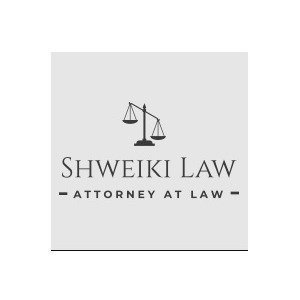Best Landlord & Tenant Lawyers in Palestine
Share your needs with us, get contacted by law firms.
Free. Takes 2 min.
Free Guide to Hiring a Real Estate Lawyer
Or refine your search by selecting a city:
List of the best lawyers in Palestine
About Landlord & Tenant Law in Palestine
In Palestine, the relationship between landlords and tenants is governed by a combination of laws and customary practices. These regulations aim to balance the rights and responsibilities of both parties, allowing for the fair use and management of rental properties. The main legal framework includes provisions relating to lease agreements, rental conditions, maintenance responsibilities, and dispute resolution. Understanding these laws is crucial for both landlords and tenants to ensure compliance and protect their interests.
Why You May Need a Lawyer
Legal situations in the landlord and tenant sector can be complex, and seeking professional legal advice can be crucial in many circumstances. Some common situations where you might need a lawyer include:
- Disputes over lease terms or conditions.
- Eviction processes and legal actions against unlawful evictions.
- Clarification and enforcement of tenant rights such as habitability, privacy, and security deposits.
- Negotiating lease renewals or terminations.
- Dealing with property maintenance and repair disputes.
- Addressing issues of discrimination in rental practices.
Local Laws Overview
Landlord and tenant laws in Palestine comprise several key aspects to ensure fair and just treatment of all parties involved:
- Lease Agreements: Written contracts are strongly recommended and often required, stating the terms, duration, rent, and any special provisions.
- Rent Control: While there is no universally applied rent control law, local regulations may influence limits on increasing rent to protect tenants.
- Security Deposits: Laws regulate how much can be charged and the conditions under which deposits must be returned.
- Tenant Rights: Tenants have the right to a habitable living environment, privacy, and protection against retaliatory actions.
- Evictions: Legal processes exist to handle lease breaches, requiring landlords to follow specific procedures to lawfully evict a tenant.
Frequently Asked Questions
What should be included in a lease agreement?
Lease agreements should include key elements such as names of the parties involved, rental terms, the amount and due date of rent, property details, and any additional agreements or amendments.
Can a landlord increase the rent without notice?
Rent increases are generally subject to existing lease terms and local regulations, often requiring advance notice to the tenant.
What are the responsibilities of a landlord regarding property maintenance?
Landlords must ensure the property is habitable and meets health and safety standards. This includes routine repairs and maintenance.
How can a tenant contest an eviction notice?
Tenants can contest eviction notices by seeking legal counsel and responding appropriately through the local legal system, often involving court hearings.
Is a verbal lease enforceable in Palestine?
While verbal leases can sometimes be enforceable, written agreements are strongly recommended for clarity and legal protection.
What action can be taken if a security deposit is not returned?
If a security deposit is unjustly withheld, a tenant can seek legal action to recover the funds, provided they have not violated the lease terms.
Can a landlord enter a tenant's premises without permission?
Landlords must respect tenants' privacy and typically require adequate notice and valid reasons to enter rented premises, unless in emergencies.
What is the process for terminating a lease early?
Early lease termination should be in accordance with the lease terms, potentially involving mutual agreement or specified notice periods.
Are tenants allowed to sublease the rented property?
Subleasing depends on the lease terms. Tenants should seek approval from the landlord before subleasing to avoid breaching the lease.
What resources are available for landlord-tenant dispute resolution?
Disputes can be resolved through mediation, legal representation, or by approaching relevant local authorities for assistance.
Additional Resources
For further guidance, individuals can consult the following resources:
- Palestinian Ministry of Local Government
- Local legal aid organizations and tenant unions
- Court systems for legal proceedings and dispute resolution
- Online legal platforms for general advice and document templates
Next Steps
If you're in need of legal assistance in landlord and tenant matters, considering the following steps can be beneficial:
- Document all communications and transactions related to your rental situation.
- Seek a consultation with a lawyer specializing in Palestinian landlord and tenant law to review your case.
- Attend relevant workshops or seminars to understand your rights and obligations better.
- Visit local legal aid offices for advice and possible pro bono representation.
Lawzana helps you find the best lawyers and law firms in Palestine through a curated and pre-screened list of qualified legal professionals. Our platform offers rankings and detailed profiles of attorneys and law firms, allowing you to compare based on practice areas, including Landlord & Tenant, experience, and client feedback.
Each profile includes a description of the firm's areas of practice, client reviews, team members and partners, year of establishment, spoken languages, office locations, contact information, social media presence, and any published articles or resources. Most firms on our platform speak English and are experienced in both local and international legal matters.
Get a quote from top-rated law firms in Palestine — quickly, securely, and without unnecessary hassle.
Disclaimer:
The information provided on this page is for general informational purposes only and does not constitute legal advice. While we strive to ensure the accuracy and relevance of the content, legal information may change over time, and interpretations of the law can vary. You should always consult with a qualified legal professional for advice specific to your situation.
We disclaim all liability for actions taken or not taken based on the content of this page. If you believe any information is incorrect or outdated, please contact us, and we will review and update it where appropriate.
Browse landlord & tenant law firms by city in Palestine
Refine your search by selecting a city.














